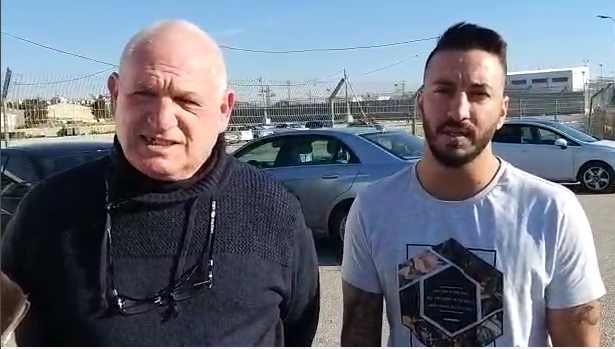Sunday, July 25, 2021, 15:54 On Sunday, July 25, a hearing took place at the Ofer Military Court of Appeals on a request for leniency by Muhamed Ibrahim Kharsa, an abettor to the Barkan terrorist. In April 2021, the Shomron Military Court sentenced Muhamed Ibrahim Kharsa to four years’ imprisonment for failure to prevent Ashraf Walid Na’alwa from carrying out the October 2018 Barkan terror attack in which Kim Levengrond-Yehezkel, Hy”d, and Ziv Hajbi, Hy”d, were murdered. Payment of 26,000 NIS in compensation was also imposed on Kharsa. The Military Advocate General and the abettor’s attorney filed a plea bargain, according to which the abettor will serve 40 months’ imprisonment, which the court accepted.
The victims’ families firmly oppose any leniency in penalization and also requested to be added as respondents to the appeal “with the understanding that any leniency given to abettors to terror constitutes severe damage to the deterrence factor and invites the next murderous attack.” The President of the Military Court of Appeals, Judge Colonel Netanel Benisho, did not accede to the families’ request. Nevertheless, Rafi Levengrond, Kim’s father, was present at the hearing, accompanied by Honenu Attorney Chayim Bleicher, who is representing the victims’ families.
Levengrond leveled criticism at the plea bargain: “They closed a new plea bargain between the terrorist and the Military Advocate General again, even though neither one of them is a side in this matter. The judge didn’t even allow me to say what I had to say, because now the two sides are cooperating and making agreements without asking me and hearing my opinion. They’re doing what’s easy for them.
“If the terrorist himself agreed to increase his own penalty from 36 months (as was agreed in the first plea bargain) to 40, he has a lot to hide and it’s better for him that he doesn’t get to a serious trial, which would include hearings and evidentiary hearings, which there should have been – to have a just trial, and not a trial sold ‘under the table’, to get rid of me and my family, to forget about Kim, because her blood is cheap. I’m embarrassed that this is my court.”
Honenu Attorney Chayim Bleicher described the culpability of the abettor as “a terrorist who knew about the intent of the central Barkan terrorist to carry out the attack. Three times he (the abettor) clarified whether or not [the terrorist] had carried out the attack, and in the end the terrorist murdered Kim and Ziv, z”l.”
Bleicher explained that during the trial hearings the military prosecution reached a plea bargain of 33 months’ imprisonment for the abettor, however the victims’ families opposed it and “the President of the Shomron Military Court accepted the opposition, ruled that the penalty did not reflect the severity of the acts and sentenced the abettor to four years’ imprisonment.
“The abettor had the chutzpa to file an appeal. Now we are at the appeal hearing and the military prosecution is defending the abettor. We alone remain to defend the citizens of Israel, victims of terror, in their demand from the court to leave standing the minimum penalty.
“Unfortunately, the court did not allow us to be respondents at the hearing and did not even allow the victims of terror to speak. However, it was obvious by our presence at the hearing that we do not intend to give up. We demand justice for the sake of the security of Israeli citizens. And thank you, Rafi, for standing strong in this struggle to increase security and deter terrorists.”
Prior to the hearing, Honenu Attorney Chayim Bleicher made a statement: “We reason that in the war on terror one must fight with all legal means and at full force. After an uncompromising struggle by the victims’ families, the President of the Shomron Military Court [Lieutenant Colonel Dalia Kaufman], handed down a clear and unambiguous ruling, a sort of indictment of the Military Advocate General regarding its lenient stance on abettors to terror.
“We call on the judicial system to get their act together and announce that they will uncompromisingly fight terror with maximum penalties and unequivocally oppose the appeal by the terrorist for leniency. When it comes to the war on terror and saving citizens’ lives, the Military Advocate General must at times leave aside the customary practice of defending plea bargains and oppose every leniency for a terrorist. Until that happens, victims of terror will bear the burden and the privilege of fighting the war on terror, including in the criminal courts.”
The attack occurred in the Barkan Industrial Park, on October 7, 2018. Ashraf Walid Na’alwa penetrated a factory and murdered Kim Levengrond-Yehezkel, Hy”d, the mother of a 16-month-old boy, and Ziv Hajbi, Hy”d, the father of three small children. Na’alwa then fled and evaded security forces for approximately two months. He was assisted by many abettors, but eventually was located and killed by security forces.

